What does EMDR therapy stand for?
Eye Movement Desensitization and Reprocessing (EMDR) Therapy.
Side to side eye movements, that help desensitize upsetting memories, thoughts, and feeling. Reprocessing the area of the brain that has become stuck, due to a traumatic event, that is preventing the left side of the brain from self-soothing the right side of the brain.
Who invented EMDR therapy?
In the 1980s, Psychologist Francine Shapiro noticed whilst walking in a park, that moving her eyes from side to side seemed to reduce the occurrence of her past distressing memories.
What type of therapy is EMDR?
Comprehensive Psychotherapy.
Psychotherapy explores past issues that maybe contributing to present day problems.
What is EMDR used for?
To help process and recover from past experiences that are affecting your wellbeing and mental health.

What is EMDR therapy used to treat?
EMDR is best known, for treating trauma or post-traumatic stress disorder (PTSD).
ÈMDR is now widely used to help with a range of mental health difficulties including:
• anxiety
• addictions
• depression
• eating disorders
• grief
• panic attacks
• phobias/fears
• sleep disruption
What is EMDR therapy good for?
Being able to see things from a different perspective and relieving symptoms of anxiety, depression and trauma.
How does EMDR therapy work?
EMDR kickstarts your brains natural healing and recovery process. By changing the way that a memory is stored in the brain, reducing and eliminating problematic symptoms.
EMDR utilizes our natural biological healing to help us process unwanted, disturbing thoughts, feelings, and memories (Parnell, 2008).
What happens in EMDR therapy?
EMDR has several stages and specific structures your therapist will work through with you. These include, assessing your current symptoms and your readiness for EMDR, as well as understanding how your past shaped your present.
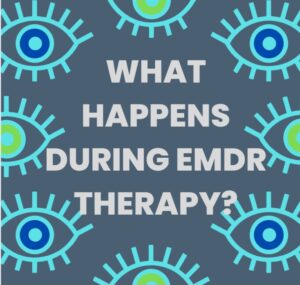
What happens during EMDR therapy?
EMDR therapy can be divided in three main parts: assessment, preparation and treatment. See our EMDR therapy London page for a comprehensive breakdown of these parts.
What to expect during EMDR therapy?
The duel-attention focus means clients are anchored in the present, but also have one foot in the past.
How is EMDR therapy done?
It involves receiving bilateral stimulation in the form of either –
• moving your eyes from side to side
• tapping movements on different sides of your body
• tones you hear through one ear then the other wearing headphones
Combined with talk therapy in a structured and specific format.
How long does it take for EMDR therapy to work?
Sessions often last 90 minutes, rather than the traditional 50-minute therapy session. EMDR sessions tend to be twice as long as traditional therapy sessions so that a client has time to fully process a memory during one session (Shapiro, 2002)
A small number of sessions around 10 can be effective. Some clients may feel relief in as few as six EMDR sessions (Shapiro, 2007).
For those who have experienced severe trauma, or more than one trauma, the therapy can last for a year.
You should leave each session feeling more empowered and calmer than you initially felt.
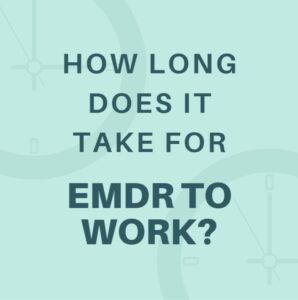
What are the dangers of EMDR therapy?
Potential dangers include emotional distress during a session when the client is re-experiencing the traumatic event (Taylor et al., 2003).
However, this distress is usually short lived.
Our skilled practitioners will be able to use safety and affect regulation protocols to avoid overwhelming the client.
What are the side effects of EMDR therapy?
Potential side effects include vivid dreams or nightmares after a session, since the mind may continue processing the information during the REM stage of sleep (Parnell, 2013).
Talking about emotions can be difficult and some clients may feel worse before they feel better. We will work with you to manage strong emotional reactions.
EMDR must only be administered by a trained and certified practitioner to reduce the potential of side effects.
How much does EMDR therapy cost?
Standard EMDR therapy cost ranges from £85 to £105 for 50 minutes or £130 – £150 for 75 minutes.
EMDR is considered to be the most cost-effective therapy for individuals suffering with PTSD.
It is important to note that we always tailor our approach to the client’s needs, this means that both pace and intensity of each session is adjusted according to the client’s resilience in facing a wide range of emotions. We offer therapeutic resources to build resilience which in turn facilitate you to achieve goals.
References.
Parnell, L. (2008). Tapping in: A step-by-step guide to activating your healing resources through bilateral stimulation. Sounds True.
Parnell, L. (2013). Attachment-focused EMDR: Healing relational trauma. W.W. Norton & Company.
Shapiro, F. E. (2002). EMDR as an integrative psychotherapy approach: Experts of diverse orientations explore the paradigm prism. American Psychological Association.
Shapiro, F. (2007). Handbook of EMDR and family therapy processes. John Wiley & Sons.
Taylor, S., Thordarson, D. S., Maxfield, L., Fedoroff, I. C., Lovell, K., & Ogrodniczuk, J. (2003). Comparative efficacy, speed, and adverse effects of three PTSD treatments: Exposure therapy, EMDR, and relaxation training. Journal of Consulting and Clinical Psychology, 71(2), 330–338.
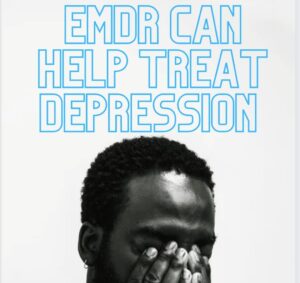 EMDR treats these symptoms by:• The reducing of re-experiencing trauma memories.• The ability to manage and cope with the memories without feeling the need to avoid potential triggers.• Being able to engage in and enjoy relationships and pleasurable activities.• A reduction in feelings of stress, anxiety or panic. Allowing the client to live their life without feeling fearful.• Reducing the feelings of depression. hopelessness and isolation.• All of which will boost self-confidence and self-esteem.EMDR treats Social Anxiety Disorder.Social phobia, also known as social anxiety can be treated using EMDR therapy. The discomfort felt in social situations can cause extreme anxiety and panic, which can lead to isolation.Social anxiety can be a frustrating cycle. The less we socialise, the more we can fear being negatively evaluated by others and judged. This behaviour furthers the deterioration of our social skills and confidence and, in turn, reinforces the existing social phobia.EMDR treats social anxiety in the same way, EMDR therapy treats depression, by targeting the negative beliefs and triggers.These may include:• Being introduced to other people• Going to unfamiliar places• Feeling teased or criticized• Thinking your watched or observed while doing something• Feeling out of place or insecureEMDR therapy can be used to treat Grief.It is ‘normal’ to feel a range of emotions when someone close to you dies. Shock, disbelief, sadness, numbness, and anger are all expressions of grief. Bereavement is something most people never ‘get over’ but in time and with support these feelings subside to a manageable level.However, if the feelings do not improve over time and are extremely intense and interfering with a person being able to function in daily life, the person may be suffering from a condition called – complicated or traumatic grief.This may happen when the loss of a loved one has been unexpected and very sudden. Or when the situation around the death was traumatic. Death which are seen as preventable maybe also more difficult to come to terms with.This trauma can feel so overwhelming and if unprocessed. A trigger such as seeing someone who looks like the person who died or passing the place where they lived or negative thoughts such as “I should of done more” can reactivate the unprocessed memories and feelings of reliving the original trauma. EMDR treats the physical feelings of grief, emotions and negative thoughts. It can work with all these levels of grief.It helps to process the trauma and get you to a point were it feels less painful, emotionally charged and in the past. The negative thoughts turn into more adaptive, useful ones like ‘I did all I could’.Counselling using EMDR can be very effective treatment in easing the trauma of grief.EMDR therapy can boost Confidence and Low self-esteem.Part of the EMDR treatment is to replace the past, unhelpful negative belief about yourself or the world with a positive one. For example – “I am a failure” to “I did the best I could” This process in itself can boost self-esteem and confidence.Beliefs are often built on past memories and unreal assumptions placed on us by ourselves or others. They are given power by repetitious and recollection. EMDR therapy breaks this cycle by helping you release old messages trapped in your mind/ body. Messages you took in with or without awareness from past experiences. Reintegration of the old, unhelpful thoughts and beliefs, with new, more positive and freeing self-perceptions will help you feel more confident.After EMDR therapy, people report feeling:• A sense of feeling more grounded and trusting themselves• More connection to their authentic self• More in touch with their sense of creativity • A capacity to see and use their strengths • Ability to embrace their imperfections that can’t be changed • More willing to invest in self growth• Ability to fully honor who they are as whole • Focus to create a fulfilling life• Able to ask and reach out for helpAs this blog illustrates, EMDR treats many conditions.
EMDR treats these symptoms by:• The reducing of re-experiencing trauma memories.• The ability to manage and cope with the memories without feeling the need to avoid potential triggers.• Being able to engage in and enjoy relationships and pleasurable activities.• A reduction in feelings of stress, anxiety or panic. Allowing the client to live their life without feeling fearful.• Reducing the feelings of depression. hopelessness and isolation.• All of which will boost self-confidence and self-esteem.EMDR treats Social Anxiety Disorder.Social phobia, also known as social anxiety can be treated using EMDR therapy. The discomfort felt in social situations can cause extreme anxiety and panic, which can lead to isolation.Social anxiety can be a frustrating cycle. The less we socialise, the more we can fear being negatively evaluated by others and judged. This behaviour furthers the deterioration of our social skills and confidence and, in turn, reinforces the existing social phobia.EMDR treats social anxiety in the same way, EMDR therapy treats depression, by targeting the negative beliefs and triggers.These may include:• Being introduced to other people• Going to unfamiliar places• Feeling teased or criticized• Thinking your watched or observed while doing something• Feeling out of place or insecureEMDR therapy can be used to treat Grief.It is ‘normal’ to feel a range of emotions when someone close to you dies. Shock, disbelief, sadness, numbness, and anger are all expressions of grief. Bereavement is something most people never ‘get over’ but in time and with support these feelings subside to a manageable level.However, if the feelings do not improve over time and are extremely intense and interfering with a person being able to function in daily life, the person may be suffering from a condition called – complicated or traumatic grief.This may happen when the loss of a loved one has been unexpected and very sudden. Or when the situation around the death was traumatic. Death which are seen as preventable maybe also more difficult to come to terms with.This trauma can feel so overwhelming and if unprocessed. A trigger such as seeing someone who looks like the person who died or passing the place where they lived or negative thoughts such as “I should of done more” can reactivate the unprocessed memories and feelings of reliving the original trauma. EMDR treats the physical feelings of grief, emotions and negative thoughts. It can work with all these levels of grief.It helps to process the trauma and get you to a point were it feels less painful, emotionally charged and in the past. The negative thoughts turn into more adaptive, useful ones like ‘I did all I could’.Counselling using EMDR can be very effective treatment in easing the trauma of grief.EMDR therapy can boost Confidence and Low self-esteem.Part of the EMDR treatment is to replace the past, unhelpful negative belief about yourself or the world with a positive one. For example – “I am a failure” to “I did the best I could” This process in itself can boost self-esteem and confidence.Beliefs are often built on past memories and unreal assumptions placed on us by ourselves or others. They are given power by repetitious and recollection. EMDR therapy breaks this cycle by helping you release old messages trapped in your mind/ body. Messages you took in with or without awareness from past experiences. Reintegration of the old, unhelpful thoughts and beliefs, with new, more positive and freeing self-perceptions will help you feel more confident.After EMDR therapy, people report feeling:• A sense of feeling more grounded and trusting themselves• More connection to their authentic self• More in touch with their sense of creativity • A capacity to see and use their strengths • Ability to embrace their imperfections that can’t be changed • More willing to invest in self growth• Ability to fully honor who they are as whole • Focus to create a fulfilling life• Able to ask and reach out for helpAs this blog illustrates, EMDR treats many conditions.EMDR is an acronym for Eye Movement Desensitization and Reprocessing.
EMDR works by stimulating the brain and body. Leading to the ability to process, unprocessed or unhealed memories. Bringing about a natural restoration and adaptive resolution and decreased emotional charge (D of EMDR, Desensitization) and a linkage to positive memory networks (R of EMDR, Reprocessing).
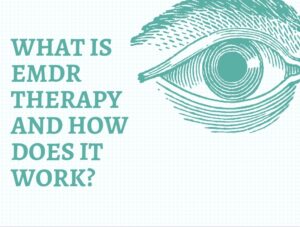
EMDR Therapy is a form of psychotherapy and an entire model of therapy. It has been proven to be highly effective for those who have experienced trauma and have Post Traumatic Stress Disorder (PTSD). As well as what are called, little “t” traumas. These are distressing events that affect us on a personal level. Examples of little “t” traumas include loss of significant relationships, non-life-threatening injury, emotional abuse and bullying.
The American psychologist Francine Shapiro created and started developing EMDR therapy in the 1980s. It was a personal discovery – whilst walking in the park, she noticed that moving her eyes from side to side seemed to reduce the her own distressing memories.
She later theorised that trauma causes negative emotions to be stored within the same memory network as a troubling events. And that EMDR, works by re-wiring these connections.
She believed EMDR works because it mimics eye movements during rapid eye movement (REM) sleep, which is known to be the time when our brain processes memories.
After treatment, people describe memories to become less vivid and more distant, they seem further in the past and harder to focus on.
Process of EMDR Therapy
EMDR facilitates the unblocking and healing of trauma, by employing very specific eight phase treatment plan. These procedures help the client access their brain’s natural healing processes.
The first is client history, followed by a preparation stage. In this phase the relationship between client and therapist is established. A collaborative and safe relationship is paramount to EMDR therapy, as well as all other models of therapy. Helpful tools and techniques are put in place, to prepare and cope with any emotional disturbances that may arise.
Moving onto the other phases will not take place until you and your therapists have assessed your readiness to do so. Honesty from both parties is a very important aspect of this process, clients safety and emotional stability is paramount at the Wellness Rooms.
The bilateral stimulation (BLS) phase is when the therapist will guide the client through eye movement, tapping or tones. These body-based techniques are employed because EMDR is founded on the basis that our emotional wellbeing is interwoven with our physical (somatic) state.
The client broaches on a troubling memory. (This is where this type of therapy differs from other trauma-focused treatments. In that, it does not include prolonged exposure to the distressing memory or a detailed descriptions of the trauma)
The client identifies the belief they have about themselves connected to the negative memory (for example, in dealing with a bullying, the person may believe “I am weak / I should of done something”). The client then formulates a positive/ adaptive belief that they would like to have about themselves in that situation (“I am strong / I did what I could.”).
All the emotions and physical sensations that accompany the memory are also identified.
The client then brings it all together.
Image, negative belief, emotions and body sensations, whilst focusing on an external stimulus that creates bilateral movement. Which in the case of eye movement, maybe the therapists fingers moving from side to side or a light bar.
This stimulates both hemispheres of the brain and moves the memory, that has been incorrectly to a more functional part of the brain.
Then the positive belief which was chosen is installed, via bilateral stimulation, to replace the negative one.
How does EMDR Work?
EMDR Therapy works by changing maladaptive neural networks connected to the memory with the new information of the positive belief. The distressing thoughts and emotions are blended with the new belief, thoughts and emotions and embodied awareness allows frozen sensations in the body to resolve.
This procedure often results in increased insight into long-held negative thoughts or beliefs about the self, which had grown out of the original traumatic event. Leading to an overall peaceful resolution for mind and body.
Is EMDR Therapy Dangerous / Dangers of EMDR therapy?
EMDR is a safe form of therapy with very few side effects. However, because this technique requires recalling a disturbing incident, stability must come first.
Phases 3 – 8 can’t effectively be practiced unless a client has experienced a safe, trusting relationship with their therapist.
At the Wellness Rooms, psychology safety and a therapeutic alliance is the corner stone to all the therapies we offer.
During phase 2 the therapist will also, help the client to learn ways to manage emotional distress during and in between sessions.
EMDR cannot be used to process trauma when a client is actively using alcohol or drugs self-medicate their emotional pain. However, we can offer you an alternative therapy to deal with these issues. Which, if still required, EMDR therapy can be accessed at a later date.
For further information take a look at our EMDR therapy London page.
Laughter is a powerful antidote to stress, pain, and conflict. It can create social bonds, improve the immune system, and serve as a coping mechanism in times of stress and uncertainty.
Laughter decreases stress hormones and increases immune cells and infection-fighting antibodies, thus improving your resistance to disease. Laughter triggers the release of endorphins, the body’s natural feel-good chemicals. Endorphins promote an overall sense of well-being and can even temporarily relieve pain.
Laughter on the Brain
The physiological study of laughter has its own name – Gelotology.
However, understanding what happens in the brain when we laugh remains a work in progress for scientists. Researchers are studying this seemingly simplistic expression in people and other animals to gain deeper insight into human behaviour and its evolution. Laughter is not purely a human phenomenon. Studies show many animals express playful vocalizations during tickling, including apes, dogs, and even rats.
A Social Affair
Research conducted by Dr Robert Provine, a neuroscientist at the University of Maryland, examines the role of relationships in laughter. His studies of people laughing during shared conversations suggest that laughter has more to do with social relationships than humour. He found that people will laugh thirty times more when there are other people around than when alone.
I have a friend who within 5 minutes of being in her company we will be laughing about nothing in particular. But interestingly I do not find that with all my friends, so is it the connection between us or is she more ‘jolly’ than some?
Dr Provine says “Laughter is not primarily about humour, but about social relationships.” Most of what makes people laugh is not thigh-slapping humour but conversational comments.
The motor and reward pathways in the brain are primarily activated when we laugh, the anterior cingulate, a brain region involved in conflict detection, is also engaged when people are presented with something humorous.
This region is not only involved in “getting” jokes but is also essential for “coping with difficult feelings or emotions or even social situations,” explains Scott Weems, a cognitive neuroscientist at the University of Maryland. “When you meet someone new, you’re going to be uneasy and not sure what to do – these are times when we laugh,” he explains.
This process rings a bell with me; I would quite often laugh when I was in a situation that I felt uncomfortable or nervous. For example; a friend and I every spring would collect all our families old clothes and bits and bobs together to sell at boot sales to raise money for our summer holiday. Whenever we arrived at the sale I would go into fits of giggles and never understood why. I would laugh until I cried; Laughter and crying can ease a stressful experience, by counteracting the effects of cortisol and adrenaline.
Laughing and crying are similar psychological reactions. “Both occur during states of high emotional arousal, involve lingering effects, and don’t cleanly turn on and off,” says Robert Provine.
I found it interesting to discover there are ten different types of laughter; amused, joyful, sympathetic, polite, relieved, disappointed, embarrassed, stressed, ironic and commenting.
What’s Funny?
Laughter is triggered when we find something humorous. There are three traditional theories about what we find humorous:
•The incongruity theory suggests that humour arises when logic and familiarity are replaced by things that don’t normally go together.
•The superiority theory comes into play when we laugh at jokes that focus on someone else’s mistakes, stupidity or misfortune. We feel superior to this person, experience a certain detachment from the situation and so are able to laugh at it.
•The relief theory is the basis for a device movie-makers have used effectively for a long time. In action films or thrillers where tension is high, the director uses comic relief at just the right times. He builds up the tension or suspense as much as possible and then breaks it down slightly with a side comment, enabling the viewer to relieve himself of pent-up emotion, just so the movie can build it up again!
Similarly, an actual story or situation creates tension within us. As we try to cope with two sets of emotions and thoughts, we need a release and laughter is the way of cleansing our system of the built-up tension and unease. According to Dr Lisa Rosenberg, humour, especially dark humour, can help workers cope with stressful situations. “The act of producing humour, of making a joke, gives us a mental break and increases our objectivity in the face of overwhelming stress,” she says.
I have found that many of my colleagues in the field of mental health have ‘Gallows humour’ a term I was unaware of before becoming a psychotherapist.
Creating Opportunities to Laugh
One of the best ways to stimulate laughter and it’s probably the most ancient way is by tickling. Tickling is inherently social; we can’t tickle ourselves. We tickle to get a response or to entice ticklee to turn around and become tickler.
Although personally I do not like being tickled; I feel a sense of powerlessness, which I am aware of its origins; an aunty tickling me when I was a child and not stopping when I asked her to.
•Watch a funny movie or TV show.
•Go to a comedy club.
•Seek out funny people.
•Share a good joke or a funny story.
•Check out your bookshop’s humour section.
•Host game night with friends.
•Play with a pet.
•Go to a “laughter yoga” class.
•Joke around with children.
•Do something silly.
•Make time for fun activities (e.g. bowling, miniature golfing, karaoke).
Incorporating more humour and play into your daily interactions can improve the quality of relationships and your connections with co-workers, family members, and friends. Using humour and laughter in relationships allows you to:
• Be more spontaneous. Humour gets you out of your head and away from your troubles.
• Let go of defensiveness. Laughter helps you forget judgments, criticisms, and doubts.
• Release inhibitions. Your fear of holding back and holding on are set aside.
All emotional sharing builds strong and lasting relationship bonds, but sharing laughter and play also adds joy, vitality, and resilience. And humour is a powerful and effective way to heal resentments, disagreements, and hurts. Laughter unites people during difficult times.
Bring humour into conversations. Ask people, “What’s the funniest thing that happened to you today, this week, in your life?”
Like yawning, laughter is contagious; the laugher of others is irresistible. I found myself laughing at the below video of ‘People laughing’
Final word, I have a list of Tommy Cooper one liners on my phone. When I need a lift I read one and giggle to myself.
“I went to buy some camouflage trousers the other day but I couldn’t find any” Hehe!
In these highly uncertain times, do you feel anxious?
Anxiety is primarily described as unhelpful thinking patterns we experience when our mind fixates on uncertainty, negatively, and threat. Anxiety is described as having both physical and mental symptoms. It can occur on its own as a response to stress or it can trigger stress, intensifying the anxiety and in worse cases leading to panic attacks. We cannot control anxiety from occurring as it’s our brains automatic survival mechanism. We can however uncover the root cause/ triggers and learn new strategies in how to respond. This is how I help my clients with hypnotherapy for anxiety.
Fundamentally there are at least three ways in which hypnotherapy can help with anxiety
1) Hypnotherapy induces calm brainwave states, as you begin to relax you become more inwardly focused and shift into alpha wave patterns. This allows you to access the zone where there is improved memory recall, reduction in pain, reduced anxiety states and a better response to stress.
When the hypnotic state deepens we access mainly theta waves. There we are in the range where our internal consciousness is increased. You are deeply relaxed, allowing your conscious mind to relax and stop the loop of negative self-talk, from the monkey mind, focusing on signals from within and creating an opportunity for learning and updating and reprogramming.
2) In the hypnotherapy session I will give you pre- and post-hypnotic suggestions along with personally sourced metaphors to help you cope with anxiety-inducing situations.
For example many people are anxious about the current pandemic and isolation resulting from lockdown . During your hypnotherapy for anxiety session I may use phrases such as….When you have thoughts about this pandemic, focusing on your breathing or becoming aware of your feet planted firmly on the ground makes you feel more relaxed
Those words are embedded into your subconscious so that when those distressing thoughts come in, you’re able to cope better.
3) I use hypnotherapy to harness the power of neuroplasticity, by allowing us to set up new neural pathways (connections) in the brain towards reducing anxiety. We have learnt how to become anxious so we can also unlearn it. This is called forgetting.
I also teach my clients self-hypnosis and grounding techniques to use in between and after our sessions to support them.
Resent Research reveals that hypnotherapy for anxiety is very effective when combined with other therapeutic interventions such as NLP, EMDR and CBT.
Certain physical and medical conditions can make us feel anxious. For example, undergoing a medical procedure can cause emotional distress. In this regard, in a 2008 systematic review revealed that hypnotherapy was an effective treatment in reducing anxiety related to surgical procedures (bypass surgery, cataract surgery, plastic surgery).
In a study in 2018 at University of Baylor hypnotherapy was successful in alleviating the anxiety of post-menopausal women.
Several studies have also explored the efficacy of hypnotherapy in treating specific anxiety disorders in a 2015 study hypnotherapy for anxiety helped obstetric patients overcome their post-traumatic stress disorder (PTSD) before giving birth. Resulting in a positive birth experience.
In 2018, a study identified hypnotherapy for anxiety as a successful treatment method for generalised anxiety disorder (GAD). When used in combination with meditation and mindfulness can help people who suffer from this disorder learn new helpful strategies, worry less, and feel more hopeful about the future.
In a review in 2019, 15 studies concluded that the average participant who underwent hypnotherapy for anxiety had a remarkable 84% more than those who didn’t receive it.
So, if you’re constantly apprehensive and restless, hypnotherapy for anxiety is an effective treatment to consider.
Written by Sam.
Accessing psychological and emotional support through online Skype Counselling UK, Zoom or Watsapp Video, has become increasingly popular during these uncertain times.
Historically face to face counselling was considered preferable, in more recent times online technologies such as Skype has made counselling, psychotherapy and hypnotherapy accessible to everyone.
At Greenwich Wellness we provide therapy online to clients living in the UK and worldwide.
Skype Counselling UK allows therapeutic support that would not have otherwise been possible during this time of isolation and social distancing.
Therapy via Skype can be invaluable to people during this current pandemic as well as those clients who are disabled or housebound, allowing access to Counselling Via Skype and psychotherapy without the need for travel and the safety of your own home.
With Skype Counselling UK your choice of therapist is not limited by location this also allows you to choose an individual who most resonates with your needs.
Almost any kind of personal issue can be addressed through online therapy. Over the years our online counselling services have helped clients with stress and anxiety issues, depression, bereavement and work-related problems, coping with difficult transitions, loneliness, sexual and self-confidence issues plus many others.
Our Counselling options can be either long or short term in English and Italian to our clients around the world. Skype Counselling UK provides a valuable alternative to face to face therapy for English-speaking people living abroad.
The physical distance of therapy via Skype can be very helpful for those who are shy and also the thought of therapy too ‘exposing’, suffer social anxiety or that they clam up in new situations.
In addition, our hypnotherapist has found this particularly useful as she can then record the session for the client to use at there own leisure and for top-ups where they feel necessary.
Research studies of online and Skype therapy showed
A 2009 study led by the University of Bristol looking at the effects of online cognitive behavioural therapy for those who suffered depression found a 43% rate of recovery in participants and one Canadian study.
But what about studies looking at the effect of video therapy in particular? A 2013 Canadian study with a focus exclusively on video counselling vs. in-person counselling reported that “video counselling and in-person counselling had similar outcomes in regards to… rate of session helpfulness, pre and post counselling self-assessment, and rate of goal completion.”
Skype Counselling UK follows the same shape and structure of the traditional face to face therapy. Counselling via Skype from Greenwich Wellness Rooms can be useful for a number of personal issues.
Our online counsellors, based in Greenwich meet with clients all over the world. This is not something new as our clients have been enjoying the benefit of seeing their counsellors when they are on holiday or travelling for work commitments for some years now.
Counselling via Skype sessions will be held weekly, by appointment. At the time of booking your Skype consultation, we will give you our Skype user name and ask for yours. Your therapist will conduct your online appointments in a private, secure room maintaining the same standards of privacy and confidentiality as in personal face to face therapy.
Those who wish to access therapy via the internet should be familiar with Skype technology. For successful online counselling, a reliable internet connection is needed as well as a private, quiet room in which to meet with your therapist online.
Payments for Skype counselling can be made by credit or debit card or by bank transfer. Complete payment details will be provided at the time of booking your initial Skype consultation. We are currently offering our hourly Skype counselling UK service at a reduced rate of £60.00 in these uncertain times to make Counselling via Skype more affordable for those in need of it.
All our therapists have a certificate in Cognitive Behavioural Therapy (CBT) and belong to professional regulating bodies in the UK and all have experience delivering Counselling via Skype therapy online. If you are interested in Skype Counselling UK via the internet, your first online appointment with one of our therapists can be made today.
Disclaimer: online therapy may not be suitable for everyone, such as those who suffer from schizophrenia, epilepsy or if you are experiencing profound and disturbing mental health issues or have suicidal thoughts, we would recommend you don’t use Skype Counselling UK.
Please contact your GP to be referred to your local mental health outpatients department.
Who are the BACP?
The British Association for Counselling and Psychotherapy is the professional association for members of the counselling professions in the UK.
They provide the framework to ensure the profession follows and adheres to the highest possible standards to protect those seeking therapy. Alongside this, they facilitate and promote research to ensure best practice.
They work alongside their members throughout their careers and put them at the heart of what they do. They understand their needs and support them in making a positive difference to the mental wellbeing of their clients.
Their philosophy is “Counselling changes not just the lives of individuals, but of families and communities”.
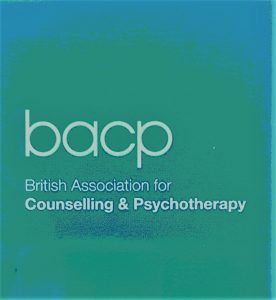
What does BACP mean to Greenwich Wellness Rooms?
All of our therapists are registered members of the British Association of Counselling and Psychotherapy or an association or authority relevant to their field. It is important to us that we ensure we are providing clients with the best service possible. Therefore by having the relevant registered memberships, we are confident they have met the high standards required and continue to train and develop their skills.
We continually explore and adhere to their best practice and use their training and guidance to make sure we are up to date with the latest methods and research.
You will find all of our therapist’s membership numbers and accreditations on their profile page on our website.
What does this mean to clients?
Seeking counselling can be a daunting prospect that takes most people a lot of courage to make initial contact. By knowing that all therapists at Greenwich Wellness Rooms are registered members of an association in their field, it means clients can be positive they are receiving therapy by a professional of the highest standard.
All of our therapist not only have a wealth of knowledge and experience but at some point in their lives have accessed the support and service they are now offering. This compliments the calm, comforting and confidential environment that we offer at our well-being centre.
The model of therapy
I am a fully qualified NLP practitioner and CBT therapist, from working together I identify the NLP and CBT tools and techniques appropriate for each individual client, including identifying limiting beliefs, unhelpful thoughts and behaviours, cause and effect, themes, reframing, perceptual positions, the circle of excellence. This approach is based on the communication model/epistemology that we all interface with the world differently. Having practical experience in a range of approaches I can customise the session to each client’s specific needs. This process is based on establishing a good rapport between therapist and client based on the presuppositions of NLP. I will support the outcome the client desires to achieve better overall well-being, make the best choices for themselves and establish what steps to take to move forward at their own pace. Each session is a confidential and non-judgemental space, the client can express themselves fully and freely to the degree required to achieve their target.
My experience as an NLP/CBT practitioner
I qualified as a life coach in 2005 and as an NLP practitioner in 2015. And in 2018 gained a certificate in CBT. The tools are invaluable and I have used them since qualifying with friends, family and work. I have used the tools and techniques professionally while managing, developing, training and motivating staff as well as dealing with conflict and communication challenges.
The above experience has allowed me to grow my practical experience and give me the skills required to help clients.
I specialise in
Addiction
Anxiety
Bereavement
Career Change
Communication
Depression
Phobias
Stress Management
My training and qualifications
AIP approved NLP practitioner training
The Life Coaching Institute Diploma in Life Coaching
Certificate in Cognitive Behavioural Therapy (CBT)
I was drawn to becoming an NLP therapist
My own experience of inner conflict, anxiety and depression was my first voyage into NLP.
I’m a CIMA qualified accountant with over 15 years’ experience in financial services and was working in a good role with a career. However, I began to feel unmotivated. Why did I fill so unfulfilled? After all the years of studying, should I not be happy? This period of inner conflict was decidedly stressful. I was anxious about letting my colleagues and family down. I was concerned about changing my career, letting go of my work identity and financial implications. These unexpressed anxieties turned into depression.
My depression looked like this, I would finish work, go home, pull the curtains and watch TV for hours, I didn’t talk to anyone, I didn’t want to go out. Often I watched TV I had seen before and I was never really watching it anyway. I would take a deep breath before leaving the house and going out into the world, I did talk to people but it was as brief as possible and if possible I would avoid it! This is one of the reasons I started my journey into therapy, to help me and now to help others.
With the assistance of NLP tools, I was able to view different aspects of my life from differing points of view. I realised how much of the problem was real or not real. This helped me to take the first steps towards the change I wanted. I realised desired a more fulfilling role that helped people, directly motivated by my coaching experience to date. I have continued to use the tools and/or techniques throughout my life journey and am honoured to be able to share them with others.
Testimonials
“Sasha was helping me through a hard time and she was amazing, she listened and helped me find ways to handle things differently, the room is very nice and calming and Sasha made time around my work life and it worked.” – Alex Charalambides
“Very helpful sessions with Sasha!” – Louise M
“I went to see Sasha for anxiety and stress. She has a pragmatic approach to therapy and we worked together so I could learn how self-manage my symptoms after the sessions ended. The tools and techniques she gave me I still use now.” – Steve
“Life coaching with Sasha Harker changed everything for me. I was in a difficult situation at work and didn’t know what to do. She gave me some tools and techniques which really started to change this. Things are changing now. I will see her again.” – Susan Fireze
“I wasn’t feeling very happy in several areas of my life. With Sasha’s help I became clear on which parts I could change and which I learnt to accept, it wasn’t what I had expected. But Sasha encouraged me to set targets on a weekly basis and for the future. I found the sessions interesting and useful, Thanks you!” – Dave

What is life coaching anyway?
‘Life coaching’ has been around since the eighties. You have probably heard of it and maybe even know someone who has been to see one.
A life coach is someone who supports, encourages and believes in you with whatever you want to look into. Whether it be work, money, relationships, family or something else.
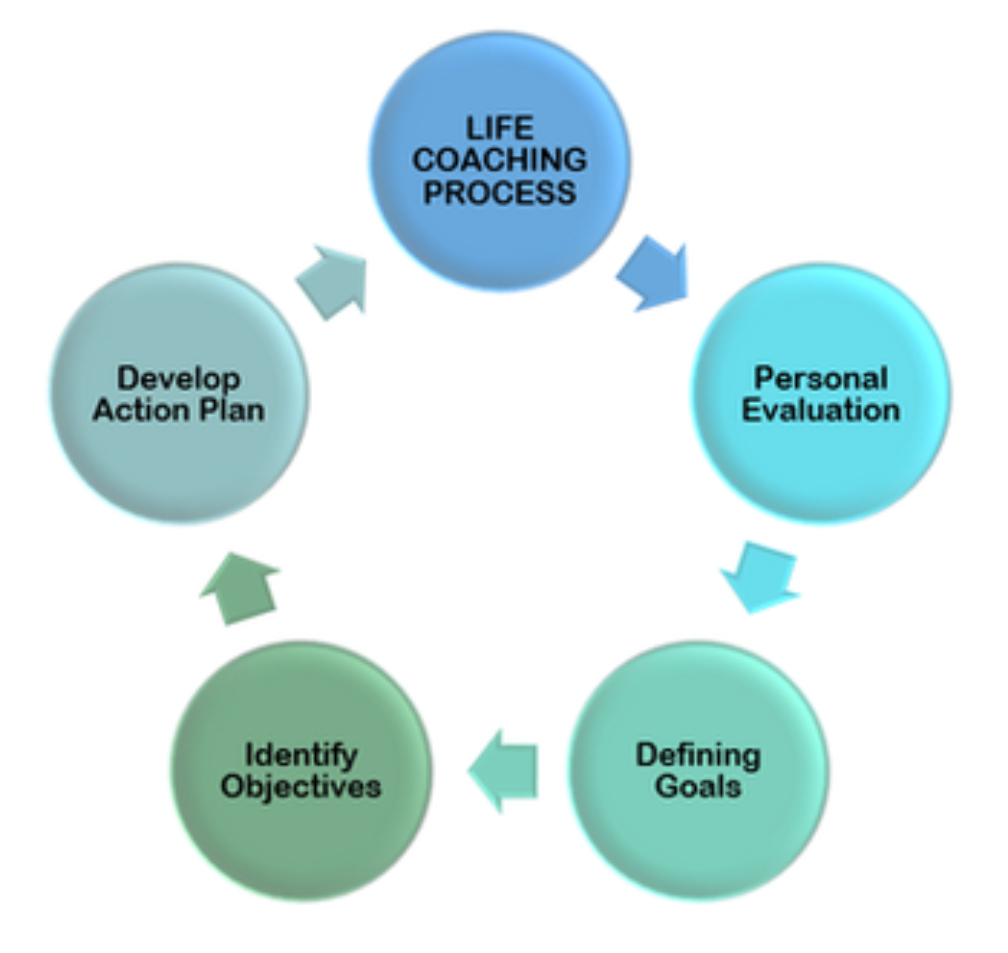
There are three categories of people that coaching works well for
Imagine you are learning a brand new sport, you take lessons to get the basics. After that you might decide to carry on or not. If you stop you will never have to play that sport again, you won’t get any better and you may remember the basics. If you choose to carry on with a coach you could become an expert. What if you have the basic skills to live your life, except you can’t stop playing? Would it be useful to have some more skills, get rid of some bad habits and maybe, have a life that you enjoy more? What if you became an expert in living and created more of a life you wanted?
It is more likely to see people taking better care of their cars, homes and family than their own mental health and wellbeing. Anxiety and stress are on the increase in society and can result in insomnia and legal addictions. What if an unresolved issue can be resolved in a few sessions and life can move forward again?
A life coaching session is a safe, non-judgemental, open space to freely discuss any area of your life including relationships, work, family matters, money matters, business, body.
How to choose a coach?
FAQ
Does a coach need to be an expert?
Yes and no. A good coach is neutral, asking appropriate clean, non-leading questions to open up an area of your life and present a different points of view. With this in mind any coach can coach on any subject. A coach can have areas of expertise depending on their life experience which will help if they remain neutral.
What can I get out of a life coaching session?
To be honest as much as you are willing to commit to. It is a client led process, where you talk openly about where you are today and where you want to be. The coach helps you organise both of those things so it is clear.
Why do I need a coach?
The reason to seek out a coach is to get clarity on a subject in a non-judgemental, relaxed, space. This clarity can help you choose goals, make changes and choices you couldn’t see before. It is a matter of finding the right coach for you.
Sasha specialises in Life coaching
Fees
From £80.00 per zoom session / From £95.00 Face to face
What is Counselling?
Being self-aware and having the capability to think and feel emotions with clarity and understanding is part of being human. Due to this, there is scope for the way we think to become a problem and to affect our emotions and our ability to live as we would like to. With the advancement of science and technology, we now have a clearer understanding of the human brain and how it functions.
Counselling is a talking therapy that involves a trained professional listening to you and helping you find ways to deal with emotional issues. It is a process that psychologically empowers you to seize back control of your life, whilst working through issues and problems that may have caused you to lose self-esteem, as well as confidence in your own abilities. Counselling will increase self-awareness and a sense of well-being and is often the first step individuals take on their path to discovering a more positive life.
What can Counselling help with?
Counselling can be useful for anyone who wants to explore the way they’re feeling or thinking further, as well as for anyone experiencing a problem or issue they need help to resolve.
Counselling can help you cope with many issues, including:
At Greenwich Wellness Rooms our Counsellors specialise in their own fields of expertise allowing us to support all clients seeking help and guidance.
What does a counselling session entail?

At your first session, you will be encouraged to talk about any dissatisfaction you may be
experiencing in your life and your feelings and emotions. The Counsellor will listen and support without judging or criticising, but will also ask questions to determine the best course of action to follow. All the information shared at the session is confidential.
It is a Counsellors role to actively listen to your problems, and mentally challenge them to encourage you to seek a solution to your concerns or issues. Counsellors at Greenwich Wellness Rooms provide a supportive service that creates a confidential space where you can freely voice your feelings.
Counselling is generally one to one and takes place in the calm and relaxed well-being centre we have created at Greenwich Wellness rooms, but it can also be held via Skype or Zoom.
You may be advised to have a single session of counselling, a short course of sessions over a few weeks or months or a longer course. The follow on appointments will generally be on a weekly basis, but the therapist will make regular progress reviews and provide you with a recommendation.
It can take a number of sessions before you start to see progress, but whilst building a good relationship with your counsellor they are supporting you and giving you the tools to improve your future.